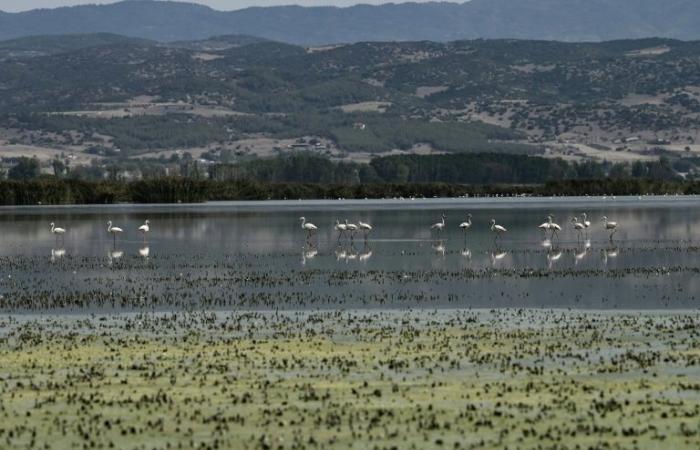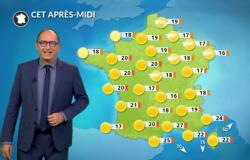“The lake has literally dried up”: in northern Greece, which is suffering the effects of global warming, residents and experts are alarmed by the state of several bodies of water in the region, where you can now walk or follow motorcycle tire tracks.
Cracked earth, dead fish and foul odors: Lake Koronia, near Greece’s second city, Thessaloniki, is suffering the effects of record temperatures recorded this summer, as are the three other natural lakes in the region, Pikrolimni, Volvi and Doïrani.
Day after day, the residents of this 42 km2 lake see the water disappear, discovering dead fish and birds.
Flamingos have found refuge in some areas where low water levels allow them to find food.
“The stench from the lake is getting very strong. If this winter is not good, if we do not have enough snowfall and rain, we will have a big problem next year,” warns Kostas Hadzivoulgaridis, president of the local community.
“We need the relevant bodies to take immediate action to protect the lake,” the fifty-year-old told AFP.
About fifty kilometers away, Pikrolimni is the only saltwater lake in mainland Greece thanks to the nearby volcanic rocks. But in this September, all that remains are the characteristic geometric patterns of evaporated water.
In the surrounding area, a spa and hotels have been gradually abandoned in recent years.
“These places used to be bustling with tourists, and now you see videos on the internet of bikers racing on the lake. It’s tragic!” says Argyris Vergis, an octogenarian from the region.
“This is the first summer that the lake is in such a state. There was no rain, the water disappeared and the lake literally dried up,” he continues.
– Evaporation –
According to the Greek Centre for Biotope Protection, from January to August the levels of the four lakes in this region of Central Macedonia were “consistently at the lowest levels in the period 2013-2024”.
In the past two years, local annual rainfall has been “very low” and temperatures recorded since early 2024 are the highest in the past decade, according to hydrologist Irini Varsami.
“This situation affects the lake either directly through evaporation or indirectly by increasing the irrigation needs of the surrounding area” of the Macedonian plain, one of the most important in the country, explains this 29-year-old scientist.
Experts are looking for solutions to preserve the balance of natural ecosystems.
“It is too early to draw conclusions on the impact on biodiversity, but we need to study the evolution of the fauna during the winter,” says Anthi Vafiadou, head of the protection section of these areas.
The winter was particularly mild in Greece followed by an early heatwave in early June, the hottest month since 1960 (when data began to be recorded), according to the National Observatory of Athens.
July and August were the hottest months since 1960, and August 2024 was the second hottest month after 2021, according to the Observatory’s measurements.
Athens’ water authority has already sounded the alarm after the level of the Mornos reservoir, the capital’s main reservoir, was reduced, at the bottom of which abandoned buildings from a village submerged during construction have resurfaced.
Athenians have been urged to monitor their water consumption, but no restrictions have been imposed so far.
Environment and Energy Minister Theodoros Skilakakis unveiled a multi-billion euro plan on Wednesday that includes new works and the modernisation of the existing network to improve water quality and limit losses.
vk-hec/yap/clr






